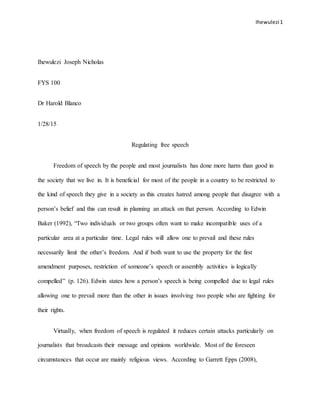Information literacy
- 1. Ihewulezi1 Ihewulezi Joseph Nicholas FYS 100 Dr Harold Blanco 1/28/15 Regulating free speech Freedom of speech by the people and most journalists has done more harm than good in the society that we live in. It is beneficial for most of the people in a country to be restricted to the kind of speech they give in a society as this creates hatred among people that disagree with a personâs belief and this can result in planning an attack on that person. According to Edwin Baker (1992), âTwo individuals or two groups often want to make incompatible uses of a particular area at a particular time. Legal rules will allow one to prevail and these rules necessarily limit the otherâs freedom. And if both want to use the property for the first amendment purposes, restriction of someoneâs speech or assembly activities is logically compelledâ (p. 126). Edwin states how a personâs speech is being compelled due to legal rules allowing one to prevail more than the other in issues involving two people who are fighting for their rights. Virtually, when freedom of speech is regulated it reduces certain attacks particularly on journalists that broadcasts their message and opinions worldwide. Most of the foreseen circumstances that occur are mainly religious views. According to Garrett Epps (2008),
- 2. Ihewulezi2 âInvestigative journalists rely heavily on sources who wish to remain anonymous. Often these sources describe acts of malfeasance or law-breaking. A frequent condition of an interview is a promise that the journalist will protect the sources identity even from law enforcement officials and grand juries. From time to time, journalists are jailed for contempt when they assert this âjournalist privilegeâ (p. 151). Garrett describes generally why most journalists are jailed due to assertions of the journalist privilege. When most journalist give their opinions about a religion or any other subject, there are certain people that disagree with such statements and this brings about extreme hatred on most journalists. As it has been seen, over the years, most journalists have been killed and are still been killed due to freedom of speech, but there are consequences. With the regulation of free speech, certain problems particularly religious views will be eradicated. According to Alan Greenblatt (2013), âFree speech, once seen as close to an absolute right in some countries, is beginning to conflict with other values, such as security, the protection of children and the desire not to offend religious sensibilities, not just in the Middle East but in much of the world, including Western Europeâ (p. 377). Alan notes that free speech that was once seen as a right everyone in a country possess has now began to cause conflict in countries. Leading to security and protection of children who are affected.
- 3. Ihewulezi3 References Baker, C. (1989). Human liberty and freedom of speech. New York: Oxford University Press. Epps, G. (2008). The first amendment, fredom of press: Its constitutional history and the contemporary debate. New York: Prometheus Books. Greenblatt, A. (2013, April 26). Free speech at risk. CQ Researcher, 23, 377-400. Retrieved from http://library.cqpress.com/


